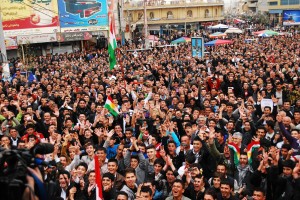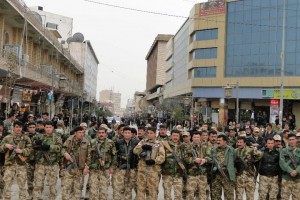
By Ahmed Mohammed.H (Kifrily):
The online free dictionary defines the word opposition as ‘a political party or group opposed to the ruling party or government.’
After the Kurdish uprising in 1991, the Kurdish people with one voice said ‘No’ to the Saddam regime. Respectable Kurdish Peshmarga fighters, with the support and help of the people, were able to free the Kurdistan region from Saddam Hussein’s savage military. Hundreds had been jailed and thousands lost their lives by various means including the Al-Anfal Campaign attacks and the use of chemical weapons in Halabja which killed 5,000 innocent civilians in a single attack.
In Garmyan, 18,000 were murdered, buried alive, and local girls were sent to the neighboring Arab countries, to sully the Kurdish reputation by making them Cyprians and bar servants. In all the Kurds were able to free three governorates – Suli, Erbil and Duhok – and the Kurdistan Regional Government (KRG) announced its separation from Iraq.
The two key leaders, Jalal Talabani, the current Iraqi president, and Masud Barzani, the current Kurdistan president, came into the political field. Each had a huge amount of support and both were fighting to gain control of Kurdistan. The top government positions were coveted and no one was willing to accept being the assistant, which ultimately resulted in a civil war.
Unlike under the Saddam regime, now neighbors were killing each other. People were killed because of the color of their clothes as the cities were divided into two main ‘colors.’ Green was the color of the flag of the Patriotic Union of Kurdistan (PUK), Jalal Talabani’s party, and yellow was the color of the flag of the Party Democratic of Kurdistan (PDK) of Masud Barzani. The three governorates were split into two regions: the GREEN and YELLOW regions. Hatred and envy was ongoing, as tribes fled from a green place to a yellow one and vice versa. Close to Erbil, ‘green’ fighters burned a village and killed about 60 residents, including woman and children, because they supported the ‘yellow’ side.
Finally in 2003, because of the US intervention in Iraq, the contestants signed a deal to divide the government ministries and leadership between the two key leaders, with Jalal Talabani given the chance for the position of Iraqi president and Masud Barzani as the president of Kurdistan. All of the government positions were divided amongst themselves without any respect for other opinions and the minority parties. They considered themselves the proprietors of Kurdistan because they had opened fire against the Baath regime. But the reality was different because all the Kurdish people took part in the Kurdistan uprising, not just Jalal’s and Masud’s families.
The people had lost what they had won by freeing Kurdistan and they had been taken over by two ruling families (Masud’s and Jalal’s). All the management positions were held either by PDK or PUK agents. If you were not from one of the parties, your rights would be taken by their patrons. They threatened and compelled people to vote for them in the elections. There were people praying for their oppressors, thinking they were doing all the right things to protect them. More enlightened people were talking about corruption inside the Kurdish government but no one was able to publicise this news in the media. The KRG had two media outlets, both being run by the ruling parties, the KDP and PUK. The internet was scarcely available and the majority of people did not know how to use it. There were some opposition parties and most of them were Islamic. They had television stations, but they were not able to say what they believed to be the truth.
Nawshirwan Mustafa, a strongly nationalist man from the PUK party, believed that this unfairness should end, and he submitted a reformation proposal to his party, but no one supported this idea and he was picked apart by his peers. He immediately resigned and formed a new party, calling it the Change Movement, which in Kurdish is “Bzutneway Gorran”. The man was considered to be very intelligent and his thoughts were deemed to be right in the minds of many. He started a television station and named it KNN, the Kurdish News Network, which strived to talk about what was happening in Kurdistan behind closed doors. Billions of US dollars were being spent in vain and oil well contracts were signed by the two ruling parties with no one else knowing where the resources were going. How are they are spending it and who is taking it? These were questions on the minds of many. But everything became obvious to the people when KNN television demonstrated the corruption with documents it had obtained. This made people think about substituting Nawshirwan who, in his first interview, said: “I am not fighting for the leadership, I am fighting for the rights of people.”
He appeared many times in a private show on KNN. This man did not look strange to the Kurdish people because he had an honorable background and most people respected him. Then the government’s and parliament’s term ended and the Kurdistan government prepared for a new election under a democratic facade. The Change Movement (Gorran) declared that it was entering the election as an opposition party and not for the leadership as it didn’t put forward any candidate for the position of Kurdistan president. Many people voluntarily campaigned for Gorran and the two ruling parties were concerned and paid out millions of dollars just to buy people’s votes.
Despite all of their methods of coercion, their threats and abductions, Gorran was able to win 25 out of 111 seats after all kinds of hoaxes. It was a surprise for both ruling parties. The Gorran MPs went to the parliament with high honor and support, and they refused to vote for issues which failed to serve Kurdish interests, unlike in the last parliament, when every discussion had ended with a 100% ‘Yes’ vote. The Kurdistan people called the ruling parties’ MPs ‘prisoners’ and ‘party robots’ because they had no power to follow what the people wanted. The Gorran parliamentary representatives did not approve every article, and they were a real opposition party as they fought for the rights of people.
Reporters started to write freely about what was occurring and the people started chanting ‘No to corruption’. On February 17, 2011 people held a demonstration against the government and they called for its dismissal. The protest continued for another 60 days. The protesters were awaiting a supportive statement from the US ambassador in Iraq, but the US government chose silence. The official media also did not report what had happened. The Kurdish government created hundreds of plans to end the demonstration but the public mood was stronger than the government expected and finally the rulers resorted to force. More than three battalions of masked militia were sent to Sulaymani’s Azadi Square, the venue of the manifestation, where they were ordered to beat and abduct the key men in the demonstration, with hundreds reportedly arrested. The NRT television station was set on fire by the ruling party’s gunmen and they finally ended the demonstration by violence.
They were not, however, able to mute the local media’s voice, which was being run by the opposition and independents and reported what had happened. In the final outcome, 10 people were killed by the gunmen and hundreds were injured. Finally, a high-ranking government official agreed to listen to the opposition and then the ruling parties wanted to negotiate.
Masud Barzini recently visited Gorran leader Nawshirwan and announced plans to arrest the killers at the demonstration and end the corruption. Leaders became more vigilant in not misusing government resources because Gorran can be found in every corner of this region. Ministries were being interrogated before the Kurdistan parliament. The corruption file was released and Facebook became a big voice of the younger generation. People became aware and everyone knew what was going on behind the curtain. The equation had changed since the appearance of the Change Movement.
Nichervan Barazni was a man who had run Kurdistan for four years as prime minister, but then he left the position with the hope of regaining it in future. But with the change of the equation, his thoughts were changed totally. The current PUK prime minister’s term was ending and Nichervan was a nominee who was being asked by his party, the KDP, to take it again. According to the media, he initially decided not just to refuse it, but he flew away from Kurdistan to the USA to relax, take a break and think carefully before running the region with an active opposition. He had already said: “I will either rule the region with the participation of the opposition in the government or I will not hold the position”.
On January 12, 2012 he came back to Kurdistan and asked his party either to reform or else he would form a new party. The position of leadership has become a red line. In Kurdish there is a word (بظة) which is used by children when they recognize that something is forbidden: if you seize it, you will wound yourself or something regretful will befall you.
Ahmed Mohammed Hussein is from Kifri and currently lives in Kalar city, south of Sulaymani. He graduated in English in 2008 and has since worked as a freelance translator and with NGOs and he has been a voluntary teacher of the art of creativity in children’s centers. He believes in gender equality and is against all the kinds of violence and discrimination.
Copyright © 2011 Kurdistantribune.com
.jpg)





Very informative, but i would have also focused on some major impacts on the government as the headline suggests.
with due respect to elders, I got a piece of advice to our political leaders.If you really care about kurdistan and kurdish poeple,prove it by starting to root out poverty , deseases and illiteracy in kurdish socitey and then kurdish poeple will trust you , like you and always vote for you. But if you want to play games with poeple and abuse your authority and power ,then oneday poeple will catch you and you will be scandalized in the media and consquently be taken by public as a betrayal kurd rather than a loyalist or a patriotic kurd.
Very great article , I really enjoy while I was reading it . Thanks for the Write I thanks his.
Ahmed , Good to read that.
Well done Ahmed, it is really influential article.Beside the title you claim to, you put you finger on sensible and shameful points in the history of PUK and PDK.
What the author candidly misses to point out is Gorran Movement inadvertent connivance in the ongoing corruption following its victory in election.
When opponent becomes proponent, then opposition no longer exist.
Speaking of opposition and the government corruption. Today Friday, Police/security forces arrested Malla Rasheed (the Imam of Salahadeen mosque in Duhok for over 15 years) from his home, a week after preventing him from giving Khutbas. They also arrested 30 men who were among the hundreds praying at the mosque today. Who gives them the right to do this? And how long are people going to tolerate this before they hit the streets? Where is Masood Barzani on this?